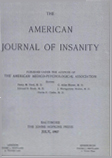Abstract
My own observations and a study of the literature point to a general agreement, in regard to certain factors, among those working on the problem of infantile convulsions and their relation to subsequent neuro-psychiatric disorders.
1. Convulsions repeated over a period of weeks or months during early life are more likely to be followed by epilepsy than a single convulsion or a series of convulsions occurring within a relatively short period of a few days or hours.
2. A larger number of children have convulsions during the first year than at any other time. Husler(14) judges that in 41 per cent of his cases the onset of epilepsy was at the age of four. This was not substantiated by our recent study where convulsions beginning in the first year were more frequently followed by serious results. Schrenk(15) finds that the peak in "genuine epilepsy" occurs around the second and the seventh-eighth year of life while the peak in "symptomatic epilepsy" is definitely in the first year of life.
3. The so-called "idiopathic" convulsions are more likely to merge directly into a chronic convulsive disorder than those of any other group except when there is manifest evidence of brain damage.
4. Petit mal attacks occurring during the first two years of life are likely to merge into a chronic convulsive disorder or become associated with mental retardation. (Morse(16); Still(5).)
5. Convulsions per se may cause cerebral damage which affects normal brain development, resulting in mental deficiency.
6. The incidence of infantile convulsions in varied samplings of children studied by different investigators appears to range from
7 to 10 per cent. The author found that 7 per cent of an unselected group of children had infantile convulsions. A fairly large percentage of all those suffering from epilepsy in adult life give a history of having had one or more convulsions prior to the fifth year of life. Of a series of 300 epileptics studied at a state hospital for epileptics(1) 50 per cent gave a history of infantile convulsions.
It has been shown by the author over a period of years that less than 1 per cent of 8000 unselected children developed epilepsy, but that 48 (12 per cent) of a total of 395 children having a history of infantile convulsions developed a chronic convulsive disorder. This would indicate that the child having a history of infantile convulsions is twelve times more vulnerable to epilepsy than a child without a history of infantile convulsions. Still(5) found that 28 per cent of the infantile attacks merged directly into epilepsy. Patrick and Levy(6) found that 4 per cent of their non-epileptics had infantile convulsions, as compared with 20 per cent of their epileptics. According to these results infantile convulsions increase the chances of epilepsy five times. Whatever the ratio may be, it seems quite evident that infantile convulsions do tend to increase materially the risk of epilepsy and mental deficiency in later life.

